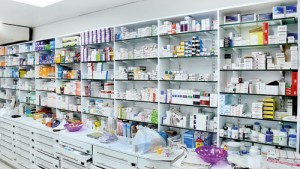News
Stay cool, pharmacies warned
View(s):The quality and potency of medicinal drugs is reduced in pharmacies that ignore regulations that mandate the use of air-conditioning, a senior medical official warned.
Cosmetic Devices and Drugs Regulatory Authority (CDDA) Director Dr. Amal Harsha de Silva said that while most pharmacies were air-conditioned others used fans that compromise on the cool temperatures needed for the proper storage of medicines.

Owners of pharmacies see double standards in the air-conditioning requirement. Pic by Anuradha Bandara
He said vehicles transporting medicines should be air-conditioned so that the quality of the medicines remained unaffected by the heat, and those vehicles needed to have special licences and be subject to checks by the Ministry of Health.
He disclosed that several containers carrying medicines had been impounded by Customs as medicines that required cold storage had been brought in them though thery were not freezer containers.
“Some products, such as certain vaccines, need to be transported within a cold chain and stored at -20C, hence separate, secure and dedicated refrigerators should be available for such medicines at all times,” he said.
“Some health products are photosensitive and will be damaged if exposed to direct sunlight.”Routine checks are carried out on pharmacies every six months by some 350 inspectors islandwide to check on storage facilities and whether any outdated products are being sold, he said. Doctors too carried out checks at times, and pharmacy licences could be rescinded in cases of noncompliance.
Owners of pharmacies see double standards in the air-conditioning requirement.
Enforcing this law only for pharmacies was unfair as government hospitals and private clinics did not always store medicines at low temperatures, Pharmaceutical Society President Chintha Abeywardene said.
Ms Abeywardene alleged that there was a racket involving the sale and renting of pharmacy licences, some going at about Rs. 200, 000 a year.
Many pharmacies were running at a loss and so the owners sold their licences, and the buyers often found it difficult to go through the pharmaceutical examination, she said.
Ms Abeywardene said more needed to be done to prevent the illegal import of drugs: strict rules needed to be implemented at airports and harbour Customs to prevent such imports and ensure the quality of drugs sold in the country.
She said drug inspectors needed to be better qualified and urged them to carry out more random checks. The owner of the Health and Glow Pharmacy in Wattala, Senthilkumar Eagambaram, said rules and regulations were not followed throughout the industry.
“The distributors, manufacturers and importers, who are not visible to the public, break the rules,” he said. For example, he said, truck drivers who transport medicines often switched off engines for long periods so that medicines were exposed to heat.
“Installing an air conditioner is costly and depends on a constant supply of electricity and requires regular maintenance – sometimes it’s hard to come up with money for all this,” he added.
J.W. Wijeyawardene, Manager at a Health Guard outlet, said dispensaries that were unable to afford air-conditioners should be issued these facilities by the Health Ministry. (AS)

